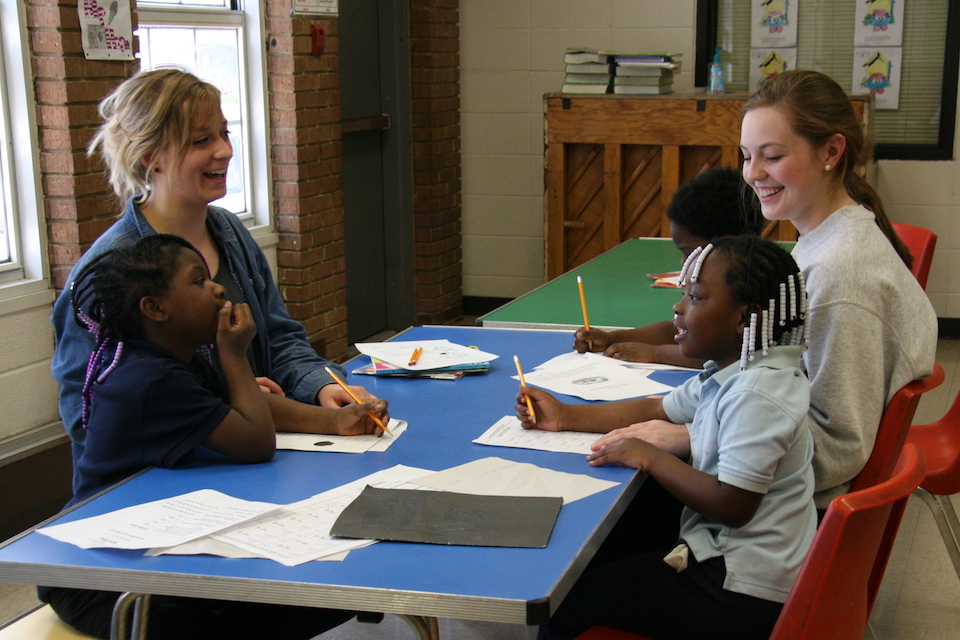SLU volunteers tackle homework, big issues in St. Louis schools
When a flat tone sounds at 2:45 pm at Walbridge Elementary School, you might want to take cover. Tiny, pint-sized humans, filled with a ferocious energy accumulated over the course of an entire school day, burst through every door in sight, charging in the direction of the afterschool program.
Jessica Roberts, coordinator for St. Louis Public Schools, is unfazed. She knows every child by name. With the grace of an orchestra conductor, Roberts guides each child to his/her destination without missing a beat.
“We do the best we can with what we’ve got,” says Roberts. About 40 children attend the afterschool program at Walbridge, which is staffed almost entirely by volunteers. Since the fall of 2014, students from Saint Louis University come to offer homework help, though the lessons often go beyond simple arithmetic for both student and teacher.
“When [the SLU tutors] can’t come, because [of an illness], the kids ask about them,” says Roberts. “Especially when they have homework and I can’t help them.” Roberts, one of two paid employees, already has her hands full.
“It has become to be about shared time and friendship, more than ‘just’ tutoring,” says Elizabeth Corcoran, a junior at SLU and a member of The Overground Railroad to Literacy – a student-run group that recruits, schedules, and organizes their peers to volunteer at three Saint Louis public schools and three community centers.
In January, the students’ efforts were rewarded with three, $1,000 grants from the United Way of Greater St. Louis. The money will fund healthy snacks for the kids at Walbridge Elementary School, school enrichment programs at the North Campus community center, and computers supplies – three laptops, one printer, ink cartridges, and printer paper – so students at Vashon High School can apply to college. Overground also volunteers at Ashland Elementary School, The Sanctuary and Missionaries of Charity community centers.
Nearly all of the children in the Walbridge afterschool program are African-American; few of the SLU volunteers are. In a mostly black neighborhood, located about 20 minutes from Ferguson, MO, echoes of very adult realities percolate through the children’s playtime.
“Sensitive topics come up a lot. They’ll say: ‘Hands up, don’t shoot’ as a joke. They’ll ask me if I know who Mike Brown is,” says Corcoran. Her time at Walbridge has positively impacted the children as well as herself: she describes the experience as “transformative.”
Learning to talk about race with children, while not losing focus on their role at the schools, has been an unexpected challenge for the volunteers. The program began just one month after Michael Brown was shot; tensions were still running high in Saint Louis.
“When hot-button issues come up, I try to listen and ask questions. One day, the kids were debating whether someone was ‘mixed’ or white, I asked them: What do you mean by that? Is white good? Is white bad?” says Corcoran, adding: “They bring up things about themselves that are hard to hear, but they really want to be able to talk about them.”
Every week, the volunteers gather to talk about their experiences at the “reflections” meeting. This semester, they are completing hour-long analytical exercises offered through the “Undoing Racism” workshop, addressing the “big” questions and how to apply it to their service.
“[Reflections] brings the service into your studies…into your life. It contextualizes service,” says Corcoran, adding: “You can do a lot of service without making ‘progress’ – it has to be more than just observing.”
“I often tell the [other] volunteers that the biggest thing you can do is: be there every week. There’s nothing bigger than that,” says Corcoran. “It’s nice [for the kids] to have one thing that is not a question: this person will be there.”
###
Originally published in April 2015.
